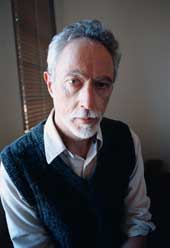 |
| J.M. Coetzee |
Stockholm, Oct. 2 (Reuters): South African novelist J.M. Coetzee won the 2003 Nobel Prize in Literature today, a choice hailed by critics who described him as an elusive man but accessible writer, both literary and politically engaged.
A white South African raised in an English-speaking home and writing in English despite his Afrikaans background, he portrays a desolate vision of his racially divided country with a lean, allegorical style compared with Franz Kafka and Samuel Beckett.
The Swedish Academy, announcing the prize, said Coetzee was “ruthless in his criticism of the cruel rationalism and cosmetic morality of Western civilisation”.
“I would hope I made one or two people think twice about whether they want to discard the past wholesale,” was Coetzee’s own modest comment on his achievements in one rare interview.
Despite critical acclaim — he was the first author to win the Booker Prize twice, in 1983 with The Life and Times of Michael K and in 1999 for Disgrace — the 63-year-old writer shuns the spotlight and did not turn up for the Booker awards.
Coetzee, who lives in Australia but spends part of the year teaching at the University of Chicago, appeared taken aback by news that he had won the $1.3-million Nobel Prize.
“It came as a complete surprise. I was not even aware the announcement was pending,” he said in a statement in Chicago.
Elizabeth Costello, protagonist of his 2003 book of the same name, says when faced with a prize-giving: “I should have asked them to forget the ceremony and send the cheque in the mail.”
Coetzee could not immediately be tracked down by the Swedish Academy to be told he had won the prize. “We have not been able to reach him yet,” Academy official Horace Engdahl had said after announcing the prize.
Swedish Academy member Per Wastberg said Coetzee was “one of the most easily read Nobel laureates in a long time” but warned reporters they would find him “particularly difficult to catch, as he rarely gives interviews”.
In his statement, Coetzee said he was continuing his own work. “I am working on new fiction and I have a book of translations of Dutch poets due out shortly,” he said.
Long tipped for the Nobel, Coetzee is regarded as a politically engaged author who also “writes prose at a higher level than most novelists writing in English”, according to Thomas Jones, an editor of the London Review of Books.
“He is a very literary writer but his literary protagonists are politically engaged,” said Jones, adding that Coetzee’s books were often also very funny.
“It is a superb choice,” said Michael Gorra, professor at Smith College in Massachusetts. He said Coetzee was “accessible to anybody who reads serious fiction” and called Disgrace “one of the most piercing novels I have read in many years”.
Born in Cape Town in 1940 as John Michael Coetzee — he later changed his middle name to Maxwell but always uses his initials — he has reworked classics such as Daniel Defoe’s Robinson Crusoe and Fyodor Dostoyevsky in The Master of Petersburg.
But his reputation rests on his treatment of post-colonial and post-apartheid South Africa — in common with fellow South African Nobel laureate, Nadine Gordimer — in books that wrestle with moral dilemmas like the violent eviction of white farmers. “I have always been more interested in the past than the future — the past and the way the past casts its shadow over the present,” Coetzee said in a recent interview.
Coetzee studied first at Cape Town and later earned a doctorate in literature from the University of Texas at Austin but was forced to return to South Africa when his application for a green card work permit was rejected.
His publishers said the intensely private Coetzee and his partner Dorothy Driver emigrated to Australia for personal reasons. Coetzee himself gave no real explanation for the decision but in an e-mail interview with a former student, he once said he looked forward to getting out of the big city. “Adelaide strikes me as a city about the right size…. I like the climate, I like the architecture. If Adelaide is slow, I like the slowness.”
He belongs to two language communities but is something of an outsider to both. That sense of dislocation permeated his work. Coetzee writes in an austere style, painting bleak worlds afflicted by death and violence.
Coetzee’s other novels include Age of Iron, Foe, Waiting for the Barbarians and In the Heart of the Country.










